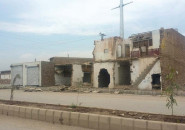Provinces demand NFC, agri tax review
NEC prefers politics over fiscal prudency

The National Economic Council on Wednesday approved an enlarged national development outlay of Rs3.9 trillion, as some of the provinces have demanded reviewing the National Finance Commission and reopening the agriculture income tax issue with the International Monetary Fund.
The NEC-approved the federal Public Sector Development Programme 2025-26 shows the government's political priorities to appease allies and spend more on roads. It approved reduced budgets for Pakistan's space and atomic energy programmes, health and education but increased allocations for the Sindh-specific projects and the parliamentarians' schemes.
Headed by Prime Minister Shehbaz Sharif, the NEC also set the economic growth target at 4.2% and inflation at 7.5% for the next fiscal year 2025-26. The NEC is the nation's constitutional body having mandate to approve the macroeconomic and development plans.
The NEC also expressed concerns over growing population and showed resolve to find a solution, as the economic growth in this fiscal year was almost equal to the population growth rate.
The NEC approved the Rs1 trillion for the federal Public Sector Development Programme and Rs2.9 trillion for the provincial annual development plans. The cumulative budgets of Rs3.9 trillion negate the harsh fiscal ground realities, as the federal government even went to the extent of further reducing some critical proposed allocations to make room for more politically oriented development spending.
As against its earlier plan to allocate Rs50 billion for discretionary spending on the parliamentarians schemes, the allocation has been approved at Rs70 billion, showed the NEC document. Not only that, the federal government further increased the spending on provinces' development project from three-day old allocation of Rs93.4 billion to nearly Rs106 billion.
The room has been created by further reducing the spending on health and education from the level approved by the Annual Plan Coordination Committee on Monday. The Higher Education Commission's allocation is drastically reduced to Rs39.4 billion whereas the Ministry of health's budget is cut to Rs14.3 billion. To make room for political projects, the allocation for power sector projects was reduced from the earlier proposed Rs104 billion to Rs90 billion. But the water sector allocation has been increased to Rs133 billion, from earlier proposed Rs119 billion.
Compared to the budget approved by the APCC on Monday, the Space & Upper Atmosphere Research Commission's (SUPARCO) budget has been reduced from Rs24.2 billion to just Rs5.4 billon while the Pakistan Atomic Energy Commission's budget is reduced from Rs4.7 billion to Rs781 million.
The budget has been finalised by a committee comprising Deputy Prime Minister Ishaq Dar and PM's political Advisor Rana Sannuallah Khan.
Such large allocations for the provincial projects are in breach of commitments to the IMF for reducing federal expense on provincial projects.
The sources said that some of the NEC members discussed the low agriculture sector growth of mere 0.6% in this fiscal year and urged to change the economic policies, including high cost of inputs. The participants of the meeting said that Sindh asked to review the agriculture income tax and take it up with the IMF.
Finance Secretary Imdad Ullah Bosal did not comment on the question whether the Ministry of Finance will take up the matter with the IMF.
The four provincial governments have passed the new agriculture income tax laws but these have not yet been enforced. There is high chance that the IMF would not entertain any such request.
The Khyber Pakhtunkhwa government took up the issue of delay in reopening the NFC award, as the provincial government is demanding higher share in the light of merger of the tribal districts. The prime minister assured the K-P government to convene the NFC meeting in August.
However, the government has further reduced the K-P merged districts allocation from Rs70 billion to Rs65.4 billion that had been approved by the APCC on Monday.
The Punjab government raised the issue of higher taxes on agriculture machinery.
The NEC approved Rs2.86 trillion for the four provincial governments, with the highest spending outlay of Punjab worth Rs1.2 trillion. Khyber-Pakhtunkhwa will spend Rs417 billion. Sindh government plans to spend Rs995 billion and the Balochistan government is proposing Rs280 billion for development.
The proposed development allocations by the four provinces are roughly Rs860 billion more than what the IMF has included in its plan. It means either the provinces will not be able to spend the entire allocations or the IMF cash surplus target will not be met.
The NEC also reviewed the implementation of the annual plan for this fiscal and approved the economic targets for the next fiscal. It also took a review of the implementation of the PSDP for the current fiscal year, taking note of low utilization of the funds.
The NEC also discussed the progress report of the CDWP & schemes approved by CDWP and ECNEC in the past one year. The NEC authorized the publication of 13th Five Year Plan 2024-29 and approved the URAAN Pakistan Implementation Framework.
Exports are projected at $35.3 billion, while foreign remittances are expected to exceed $39.4 billion in the next fiscal year. Imports are projected at $65.2 billion with the current account deficit estimated at $2.1 billion for the next fiscal year.
Currently, 1,071 development projects with a total cost of Rs13.4 trillion are under implementation. These projects require an additional Rs10.2 trillion to be completed, and the planning ministry estimates it would take more than a decade to finish them all.
The NEC also approved to publish the Five-year economic plan 2024-29. The NEC was told that 13th Five-Year Plan has been updated as a result of stakeholders' consultations and is ready for publication
the five year's plan is aimed at a balanced regional and equitable development, enhance export orientation of the economy - vibrant SMEs sector - social protection and poverty alleviation - improve the quality of human resources - moving into the knowledge economy - adaptation and mitigation strategy to combat climate change.
The Prime Minister had launched 'URAAN Pakistan' on 31st December, 2024 and the NEC on Wednesday approved its implementation framework.




















COMMENTS
Comments are moderated and generally will be posted if they are on-topic and not abusive.
For more information, please see our Comments FAQ